
Exclusive Interview with Ron Dennis
Atlas F1 Senior Writer
McLaren-Mercedes have left the Australian Grand Prix with a single Championship point, a mechanical failure, and even more pressure from media and fans who wonder, just what happened to the marque that was the benchmark for excellence and success? Atlas F1's Roger Horton sat with team chief Ron Dennis on the morning of race day for a frank interview about challenges and failures, emotions and retirement. "We will come back to dominance, that I am convinced of," he promises
Dennis owns 30% equity in the McLaren Group but actually controls 60% because of his arrangement with his long standing partner, TAG's Mansour Ojjeh, who also holds 30%. DaimlerChrysler owns the balance of 40%. This arrangement gives Dennis effective control of his company.
At the opening round of the 2004 season this benchmarking process continued, only the teams doing the benchmarking were no longer just Ferrari and Williams - the other two members of that exclusive club known as the 'big three' - but also the improving Renault team, and - worst still for the embattled team Dennis, presiding over a hastily called technical debrief at the team's Woking headquarters, the fast improving Honda powered BAR team, so recently the butt of many paddock jibes.
Statistics can be made to prove almost anything, but in Formula One they have a purity from which there is no escape. The stopwatch is not political and the chequered flag knows no favourites, and yet a McLaren car has reached that flag first just seven times in the last three seasons. Counting the latest race in Australia, Ferrari have enjoyed 33 victories in the same time period. Even Williams, bedding in a new relationship with BMW, have outscored McLaren, taking nine wins.
Look back a little further and McLaren's recent form comes into sharper focus. Between 1998 and 2000 the team scored no less than 23 race wins, and of course back to back drivers' titles for Mika Hakkinen. But, despite being in contention throughout last year, McLaren always appeared to be playing catch-up, always scrambling to react to Ferrari's momentum. Then, of course, there was the MP4-18 no show, adding to the feeling in some quarters that somehow the much vaunted McLaren machine, if not off the rails completely, had certainly taken a wrong turn. But how does Dennis himself view the team's current lack of form?
"If you are in a situation where the media is asking those sorts of difficult questions, you tend to be somewhat protective of your position," Dennis responded in an interview with Atlas F1 on Sunday morning. "But when we are back analysing these things in the privacy of our corporate offices we are extremely tough on ourselves. We are keenly aware each year what went wrong. The fact is that each of the last two years we were Championship contenders right through until the end of the season, and you have the situation where the competition is very strong.
"If it were easy to win - and I am not making any excuses for our own failures - If it were easy to win, you would see the wins spread more evenly though the field. But if you go down the list of teams and drivers and you write alongside each of the names who is a winner, you would be surprised what jumps out at you from those pages.
"You would discover that only three teams have consistently won, and those teams have tremendous biorhythmic performances and everywhere you look at the moment you see red and you see an allegiance to Ferrari. But they didn't win a Championship for 21 years and there were lots of competencies in the team. This is a challenging sport.
"I am not making any excuses for our lack of performance but it is hard for people to grasp just how difficult it is to win. This is a sport where you spend a fortune to get a little. The amount of research and development we do to try and find a way to increase the performance of the car within the limitations of the rules and regulation which are very strict. And it's just huge, and you have a conviction that you are going forward, and you do go forward.
On Management
The recent lack of form at McLaren has spurred speculations that Dennis may soon retire from the running of the team, or even sell his shares to Mercedes. In reality, though, Dennis has already taken a step backward from the day to day management of the team but there's little chance he would leave it all behind any time soon.
"We know where we are going," Dennis says. "We equally understand that when people stand back and look at us, they look at reasons that are easy to read. One criticism levelled against me at the moment is that my personal attention has been taken up by the new McLaren Technology Centre that we built, or because of the SLR programme.
"The reality is that, yes, I was the person who controlled the whole MTC programme, but long before that my responsibilities in the racing team had been taken over by Martin Whitmarsh. And then people say, ah, that's it, he is not as good as you are.
"But my view on that - putting aside that I think he is extremely competent in his job - is that no individual can be around forever and I think the worst thing any manager can do is act like a light switch - one minute you are there, one minute you are not. You have to have overlap when you are trying to protect the grand values, the credibility and integrity of an organisation. It takes time, overlap takes time."
RH: Usually in this business a leading team's loss of form coincides with a change of engine partners, but you have had a stable relationship with Mercedes since 1995. So how do you explain that?
Dennis: "Clearly the best way to answer that question is absolutely truthfully. But the truthful answer to that question would be like opening to the world our weaknesses as we perceive them. We think we understand them, they are not going to be fixed in five minutes, but they will be fixed. Nothing is more certain than that we will come back to dominance, that I am convinced of."
RH: Most observers believe that BMW, relative newcomers to the sport, have a more powerful engine than your Mercedes unit. Isn't this of concern to you?
Dennis: "This would, if answered, put me in a difficult situation. If I say yes it certainly doesn't put a positive spin on our relationship with Mercedes Benz. If I say no it would be an indication that this wasn't an area where we need to improve. The right answer is that the performance of a Grand Prix car is controlled by a number of parameters and every one of these parameters needs to be strong. You can't carry an aerodynamic problem, you can't carry an inferior driver, you can't carry being with the wrong tyre company, you can't carry not having the best engine.
"So all of those areas are important. And when it comes to the engine of course you want more horsepower, you want more revs, you want better fuel consumption; you want all these things. You are never satisfied. Is our lack of performance solely and exclusively down to one of those parameters and specifically the engine? The answer is no. We don't hide behind those elements that, to a certain degree, we are not in control of; that would be a soft option."
Nevertheless, based on what we saw at Albert Park, the Michelin runners were all struggling to some degree against Ferrari but McLaren were behind Williams, Renault and BAR - all on the same rubber, even if the compounds and set-up were different. So it is impossible to imply that McLaren's poor showing in Melbourne was tyre related.
On Strategy
On the morning before the race, and despite a poor qualifying result that saw Kimi Raikkonen and David Coulthard end 10th and 12th respectively, Ron Dennis was still optimistic that their cars will finish in a strong position once the chequered flag was waved at the Australian Grand Prix.
"We know that we don't have the car as well balanced here as it should be," he explained. "We didn't qualify in a position that we would regard as being optimum with our own evaluation. However, as the race unfolds, clearly we have a view as to what the right race strategy should be, which I think is a different view from the vast majority that qualified yesterday.
"There is understandably a 24 hour high you get from a good grid position. I can assure you that the high you get from having a good result is far more long lived; it goes into the record book and counts towards your points for the World Championship.
"It requires discipline to carry through what you believe to be the right strategy and whilst there were a couple of parameters [in Australia last year] that played to our strategy - damp circuit, safety car deployment - the simple fact is we went from 17 and 11 on the grid to what would have been a one two finish had it not been for a drive through speeding penalty that Kimi received. As it was, the result was a one-three. Are we going to achieve that today? No, probably not. Will we, subject to the reliability of our cars, finish in a strong points scoring position? I think we will."
Bearing these comments in mind - and since both McLarens were on a two stop routine, it seems Dennis might have been hoping that their qualifying pace had been misleading. Unfortunately, Coulthard's fastest laps in the race was still some 2.2 seconds slower that Michael Schumacher's, so whichever way you slice it the McLarens were just off the pace in Australia.
RH: Isn't the fact that you didn't get to launch a new car last year systematic of McLaren's current problems?
Dennis: "The thing with people, especially in the media, is they get fixated with what a team does with those sorts of issues, and they lose sight of the fact that the objective of being in Grand Prix racing is to win the World Championship. There is no question that we had the opportunity to race that car (the MP4-18) if we had wanted to, but what was very clear was that by taking elements of that car and incorporating them into a bullet proof, engine, gearbox, chassis combination - together with some suspension changes that we made for Monza - that was the way that we were most likely to win the World Championship.
"So we have come into this season extremely mindful of the fact we did not win or lose the World Championship at Suzuka. You lose a World Championship because of your results throughout the whole season. It could well be that the World Championship is won this year by a team with only one or two race wins. It is now essential to finish, it is even more essential than it has been before. Now, [winning the Championship] is more difficult than it has ever been."
On Emotions
Under the constant gaze of the media Dennis can be extremely painstaking, some would say fanatical, in ensuring that questions concerning his team are answered fully and correctly. Detractors have made a small industry of this so-called 'Ron Speak', but the reality is that few individuals, and certainly not many in the F1 paddock, reveal their character so fully when engaged by a journalist with a notepad.
His public image is that of a tough, sometimes arrogant team boss that demands perfection and remains distant. But every once in a while, Dennis reveals himself to be an emotional and sensitive person, and never more so did this culminate than in his relationship with former McLaren driver and two times World Champion, Mika Hakkinen.
"I try and have a special relationship with all drivers," Dennis says. "The difference between the relationship with all the drivers that have been with the team and Mika is that I was party to the time during and after his accident [in the 1995 Australian Grand Prix]. And if you have a relationship with an individual and you are sitting by his bedside watching someone fighting for his life and then survives and recovers and goes on to win, then that in itself makes the relationship different.
"You have been in a different place in your head and you have different emotions and you have been through the process of saying, what if? Would I continue? Would I still have the appetite for it? You go through those thought processes at the time it was happening and that changes you, it changes the relationship."
But it's not just his relationship with Hakkinen that opens a window to Dennis's personality. Take the team's last win, for example: a year ago, in Malaysia, Hakkinen's replacement and compatriot Kimi Raikkonen took his maiden win, and the television cameras caught Dennis on the pitwall with a tear in his eye. What is that special to him?
"First of all I am always emotional about winning," Dennis responds. "For me, the emotion I feel about winning is very much linked to the chemistry, the physical chemistry of winning. If you have been in motorsport for a long time you have experienced all the last lap failures, the mechanical things that go wrong two or three laps from the end, being under the weight limit, all the other things that can take away that race win.
"So as a race end approaches all these thoughts go through your mind and you get wound up and then at the point at which you win there is an adrenalin rush that takes place. And that really can put you in a position where the overwhelming sense of relief puts you into a tearful state of mind. Strangely it is a negative emotion, not a positive one, because you feel your body reacting literally to a release of endorphins or something.
Most people would say, after achieving something special - and a Grand Prix win is certainly special - that they were simply happy, or pleased, or relieved, or a combination of all these emotions. Lotus founder Colin Chapman, for example, used to throw his cap in the air in joy and jubilation at every GP win.
But clearly Dennis, who has had plenty of experience in the winning stakes, felt the need to explore his own emotions to an enormous degree, as if a momentary loss of control was something to be thought about, analysed, categorised and perhaps guarded against in the future. Given that Dennis is currently the man bearing the brunt of the pressure of his team's failure to perform, you can only imagine how he might react when his team returns to the winner's rostrum.
And when it comes to Dennis and McLaren, there is no question that sooner or later, they will.
At the beginning of last season, Williams and McLaren jointly launched a legal action against the FIA claiming that the governing body was in breach of the semi secret Concorde agreement in the way they forced through changes to the regulations for the 2003 and 2004 season. Since then, however, the negotiations to settle the car makers' threat to form a breakaway series (the GPWC) have become the format for a completely new deal that will replace all existing agreements.
"We are in a position that we have agreed [with the FIA] in principle a resolution to avoid the arbitration going forward," Dennis explains, "but it is yet to be totally documented, so we are currently - both ourselves and the FIA - trying to avoid a lengthy and costly process and put in place a resolution that precludes the type of situation at the beginning of last season repeating itself."
RH: When the GPWC issue is resolved, would it also address the issues raised in the arbitration?
Dennis: "It will. That is a clear, agreed position. But we seek some reassurance between now and when that document is in place, as that will be a long and protracted negotiation. It is a complex document that is designed to cover the technical and commercial aspects of motor sport for another ten years so it is not going to be easy to complete in a short period of time. But it's heading in the right direction."
Speaking of commercial agreements, Dennis faces another future obstacle he must tackle. All Formula One teams are under pressure to phase out the funding received from tobacco companies, as gradually regulations worldwide would ban tobacco advertising and sponsorships. Even for a major team like McLaren, replacing the huge financial support that their title sponsor West provides will be a major headache.
RH: How long do you think McLaren and West can continue their relationship, assuming that both parties wished to?
Dennis: "The situation is extremely complex. There are various parties pulling in different directions. To give you a complete understanding would be inappropriate. Simple answer to your question is that I honestly don't know. Every indication is that European legislation will not bite earlier than the end of 2006, although there are some factions that are trying to interpret elements of the regulations in such a way as to bring that forward to a date in 2005. I think personally it will be 2006.
"I think it will become very clear that it is going to be different in respect of Europe and the rest of the world, and whilst the rest of the world has adopted policies that relate to the World Health Organisation, the countries that are enabling that probably won't put it in place before 2009. So it's an open and complicated issue.
"From our standpoint we have always had very long and stable relationships with all of our sponsors and we tend to earn longevity and trust in the relationships, and we are certainly not looking to put pressure on anybody who is investing in us to go in a different direction. This is not an issue which is in our power to control."
Thinking of McLaren? Think of eight Constructors' Championships between 1974 and 1999. Think of eleven World Drivers' Championships at the same time. Think of 137 Grand Prix wins and 114 pole positions. Think of McLaren and one word springs to mind - excellence. For decades, McLaren have been the benchmark team against which others have measured their own progress. If Ferrari had the glamour and mystique, and Williams the bulldog British spirit, winning races in foreign lands, then McLaren in recent years have been the Greys, the epitome of cool efficiency that often ground their opponents without fanfare or pity.
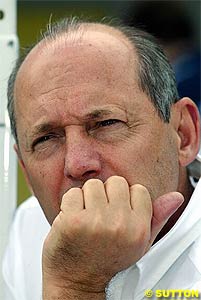 Since 1980, when Ron Dennis's Project Four merged with Team McLaren to form McLaren International, the 56 years old Englishman has also been synonymous with McLaren's success. During the eighties and early nineties - first with TAG Porsche power and later with Honda - McLaren won six of those constructors' titles. It was Dennis who broke new grounds in the presentation of his team to sponsors and he master-minded the transition of racing teams into relatively large organisations that require professional management as the technology became more and more complex.
Since 1980, when Ron Dennis's Project Four merged with Team McLaren to form McLaren International, the 56 years old Englishman has also been synonymous with McLaren's success. During the eighties and early nineties - first with TAG Porsche power and later with Honda - McLaren won six of those constructors' titles. It was Dennis who broke new grounds in the presentation of his team to sponsors and he master-minded the transition of racing teams into relatively large organisations that require professional management as the technology became more and more complex.
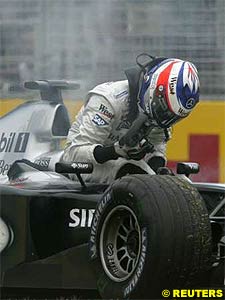 "We are one point something seconds faster here than last year. Unfortunately, someone else is two point something faster. That is the nature of the beast, it's not as if you are going backwards, it's just that you are not going forward as fast as your opposition."
"We are one point something seconds faster here than last year. Unfortunately, someone else is two point something faster. That is the nature of the beast, it's not as if you are going backwards, it's just that you are not going forward as fast as your opposition."
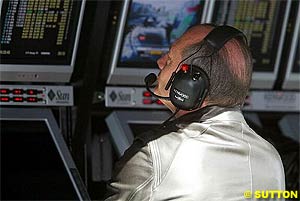 That means that McLaren's problems are all in house - either chassis or engine - and it would be a major surprise if suddenly technical director Adrian Newey had produced a poor chassis.
That means that McLaren's problems are all in house - either chassis or engine - and it would be a major surprise if suddenly technical director Adrian Newey had produced a poor chassis.
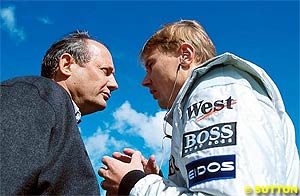 Ron Dennis is a complex and, perhaps, an often misunderstood man. "I always like to say that I never came through the front door into Formula One, I climbed in through the back window," he quipped as we talked in his temporary office at the Albert Park paddock.
Ron Dennis is a complex and, perhaps, an often misunderstood man. "I always like to say that I never came through the front door into Formula One, I climbed in through the back window," he quipped as we talked in his temporary office at the Albert Park paddock.
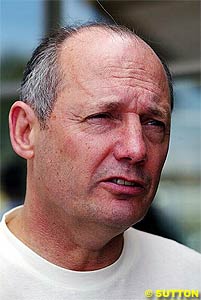 "I can handle the first half a minute... but, you know, that is human beings. When you are working, emotion is a luxury, you are not going to affect a judgement in an emotional state of mind, so that's another thing where you have taken off the mental handbrake. Up to that time you are evaluating what could go wrong, what should my reaction be, what if I have to make a decision in these last few laps, and suddenly you reach the point where this is no longer necessary and you get this rush. And for me, I just need a few seconds to collect myself, but sometimes you are caught because the cameras are looking for it."
"I can handle the first half a minute... but, you know, that is human beings. When you are working, emotion is a luxury, you are not going to affect a judgement in an emotional state of mind, so that's another thing where you have taken off the mental handbrake. Up to that time you are evaluating what could go wrong, what should my reaction be, what if I have to make a decision in these last few laps, and suddenly you reach the point where this is no longer necessary and you get this rush. And for me, I just need a few seconds to collect myself, but sometimes you are caught because the cameras are looking for it."
Sidebar: On Business and Politics
|
Contact the Author Contact the Editor |
Please Contact Us for permission to republish this or any other material from Atlas F1.